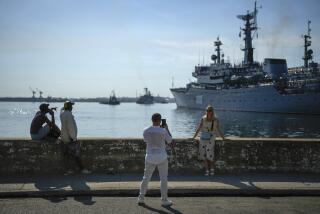COMMUNISM : Cubans Raise Protest Voice--in Moscow : Some of the elite sent to Russia for schooling don’t want to go back to Castroism.
MOSCOW — Move over, Miami: The newest hotbed of Cuban dissident activity is the longtime capital of world communism.
Cubans who were sent to Moscow to become the ideological and technical cadre of Fidel Castro’s regime ended up catching democratic fever as they watched Russia reject communism. Now as many as 500 Cubans living in the former Soviet Union are refusing to return to Cuba.
One hundred of them have banded together in a dissident group called Union Cubana to try to fight the Castro regime by publishing a newspaper and smuggling copies into Cuba, demonstrating at the Cuban Embassy in Moscow and helping their countrymen escape from Cuba via Russia.
A front-page political cartoon in Cubinex, Union Cubana’s publication, shows a frightened Castro falling toward a stake: “Miami-Madrid-Moscow are the obstacle that Castro trips on to impale himself on the dagger prepared by the internal resistance.”
Castro’s feelings for the Moscow dissidents are not any warmer. He calls them “Red worms,” a variation of his name for Miami Cubans, “worms.”
Now the “Red worms” and the “worms” have gotten together to help 300 Cubans living in the former Soviet Union emigrate to the United States.
By agreeing to pay for the refugees’ resettlement, the Cuban American National Foundation struck a deal with officials in Washington to raise the quota of Cubans allowed to emigrate to America this year.
The Union Cubana spread the word to Cubans across the former Soviet Union, many of whom are living here illegally. An official from the U.S. Immigration and Naturalization Service has visited Moscow to interview the Cubans; those accepted will leave within two months, said Joe Coleman, a State Department official acquainted with the deal.
Cubans from third countries like Argentina and Spain have emigrated to the United States but never from as far away as Russia.
Not all of the applicants are students sent to the old Soviet Union by Castro.
Juan Carlos Bencono, 35, a factory manager, and his wife were fired from jobs in Havana and repeatedly harassed after he told a foreign television news team what he thought of Castro. “I decided to tell the truth, that it only appears that everyone in the country is in accord with Fidel. In reality, everyone is against him,” Bencono said.
After four other escape plans failed, he and his wife slipped out of Cuba by bribing an official with $5,000 to give them tourist visas to Czechoslovakia. But once they got there, they had no way to America. After six months as illegals in Czechoslovakia, living on the streets, their relatives told them to get to Moscow and go directly to the Union Cubana headquarters.
Now they’re waiting to hear whether they will be allowed to join relatives in Florida. “I don’t know what the United States is like,” Bencono said. “But I know that there is democracy and freedom there.”
The members of Union Cubana tell similar stories of what made them make the jump from prized citizens of Cuba to outcasts.
Alvaro Alba, a Union Cubana leader, went to Russia in 1982 to study history and to be part of a new generation of ideologists for Castro. But halfway through his studies, a man named Mikhail S. Gorbachev came to power and started disclosing the truth about Soviet history. Instead of learning the glories of communism, Alba learned to see through Castro’s rhetoric.
“I understood what was happening in my country was not communism or socialism but a variation of Stalinism,” Alba recalled.
The trouble started when he went back to Cuba in 1987 and was assigned to the Interior Ministry.
His superiors warned him that enthusiasm for the Russian reforms would not be tolerated. “I soon understood that I could do nothing in my own country,” he said. “You either have to obey or go to prison, so I decided to go back to Russia and do what I could from here.”
While many of his fellow dissidents are trying to emigrate to America, Alba keeps his sights on Havana and the graceful beauty of Cuba’s beaches, saying, “Castro is not immortal. My dream is to return to Cuba, a Cuba where no one dictates what I must say or do.”
More to Read
Sign up for Essential California
The most important California stories and recommendations in your inbox every morning.
You may occasionally receive promotional content from the Los Angeles Times.










